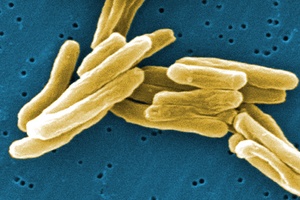Totally Drug Resistant TB strain turns up in patients in India
Doctors at the Hinduja National Hospital and Research Centre in Mumbai, India, are reporting on a strain of tuberculosis (TB) emerging among patients that is resistant to all first- and second-line drugs used to treat the bacterial infection. At least twelve patients have been identified so far. The doctors do not present evidence that the resistant strain is passing from human to human, and mostly focus on how TDR can develop in TB infected individuals due to poor treatment management.
A letter to the editor appeared in the journal Clinical Infectious Diseases in December describing the four “first” patients in India found to have TDR-TB at Hinduja Hospital. “A careful audit of their prescriptions revealed that these 3 patients had received erratic, unsupervised second-line drugs, added individually and often in incorrect doses, from multiple private practitioners (mean, 4 physicians during a 18-month period) in an attempt to cure their multidrug-resistant (MDR) tuberculosis,” according to the letter.
The authors call India’s Revised National TB Control Program a “tremendous success,” but highlight a serious flaw – while the program provides first-line TB drugs for free, “patients with MDR tuberculosis are currently not covered, with only one percent having access to Directly Observed Treatment Short-Course (DOTS)-Plus initiatives.” Those presenting with drug resistance either have to seek treatment through a private practitioner and pay for it out of pocket, or forego treatment. Second-line TB drugs can cost as much as 100 times as much as first-line drugs, and can have more side effects.
The letter also references a 2010 article in PloS ONE that found that little had changed in terms of TB prescription practices by private practitioners in Mumbai over the last ten years, with less than three percent of doctors surveyed able to write an appropriate prescription for treatment of MDR-TB, undermining TB case management improvements made in the public health sector.
In India, prescriptions and medical qualifications are not regulated by a government entity, according to the letter. Considering the number of people in India seeking care from private practitioners (in 2007 more than 80 percent of healthcare spending in the country was made in the private sector), the opportunity for drug resistance to develop is plentiful. The CID authors urge patients with MDR-TB in India to only be treated in government-sanctioned facilities using DOTS, and that the government support this treatment.
Although few cases of the Totally Drug Resistant strain have been reported previously – in Iran in 2009 and in two HIV-positive women in Italy in 2003, according to an article by NPR – Carol Dukes Hamilton, MD, says everyone in the TB treatment world has taken care of a few patients with “TDR” TB.
“It’s not like this has never happened before,” said the FHI senior scientist and co-chair of the Center for Global Health Policy. “Their report, however, highlights a problem that might grow if India continues to ignore the problem.”
By Meredith Mazzotta
Science Speaks


